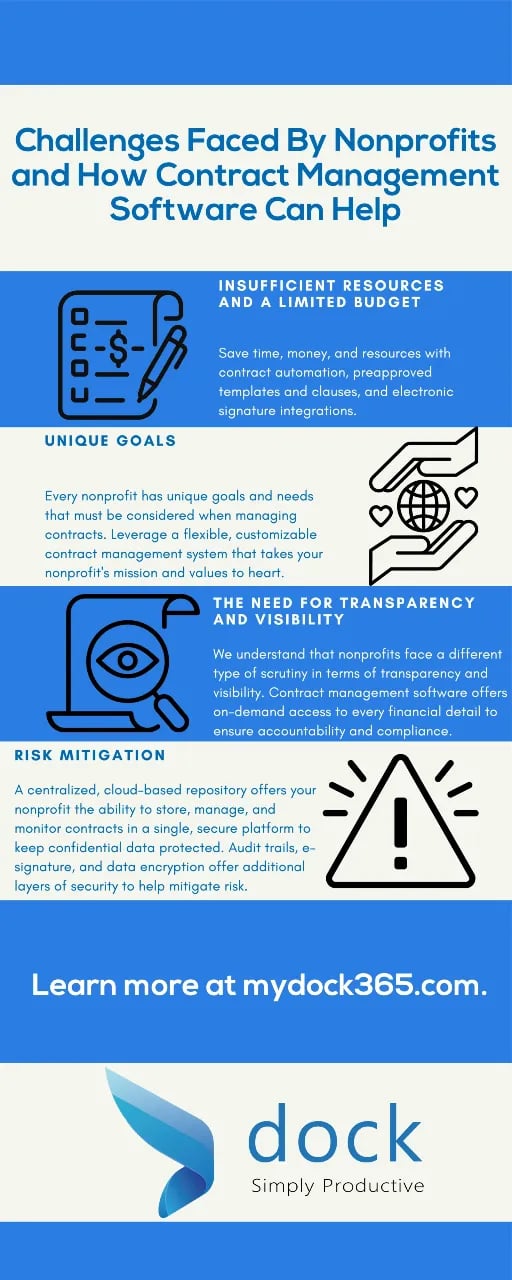
Contract Management Software for Nonprofits: An Overview
Many nonprofit organizations (NPOs) have made the transition to contract management software to improve and automate their contract-related processes.
Content:-
- Why Contract Management Software Fills In Gaps for Nonprofit Organizations
- Challenges Faced By Nonprofits and How Contract Management Software Can Help
- Insufficient Resources and a Limited Budget
- Unique Goals
- The Need for Transparency and Visibility
- Risk Mitigation
- In Review
- Conclusion
Why Contract Management Software Fills In Gaps for Nonprofit Organizations
Nonprofit organizations work for the greater good to achieve charitable goals that will inevitably help others in the community. For an NPO to successfully reach their goals, it’s necessary to implement a contract management software solution to help with contract signing and monitoring. An NPO will most likely work with quite the variety of contracts. For example: vendor contracts, grants, real estate lease agreements, employee contracts, and several others.
One essential piece to the nonprofit contract management puzzle is how NPOs are required to sustain counterparty contract relationships successfully, meaning things like funding will need expert-level management of obligations and deliverables. This is because you need to ensure that contract needs are fulfilled and that the process set in-place is fully compliant.
Additionally, managing various types of agreements, including non-profit event contracts, is crucial for organizing successful fundraising activities and ensuring that all parties meet their commitments.
Challenges Faced By Nonprofits and How Contract Management Software Can Help
Every contract is associated with inherent risks and possible challenges. In terms of contract management for nonprofit organizations, you might find yourself facing some of the following challenges; however, a contract management system can help.

Insufficient Resources and a Limited Budget
Nonprofit organizations commonly operate with low funding and modest budgets than that of their for-profit counterparts. Managing contracts can be even more strenuous under these conditions and making the investment in contract management software is certainly a wise decision that will assist financially in the long run.
A manual, paper-based approach to contract management requires more time, resources, and money than you might think – and with a limited number of resources and funding, it’s definitely not a conducive contract management strategy. The worst thing you want is to be missing your contract expiration and auto renewal dates, milestones, obligations, and other deadlines due to an outdated process. With your contract management software, you can help your team streamline each stage of the contract lifecycle and reduce the financial tension placed on your nonprofit organization. With contract automation, you’ll be able to save time, money, resources, and your employees’ energy when working through mundane contract tasks.
Unique Goals
Nonprofits have vastly different needs and goals when compared to the needs and goals of businesses. This largely plays a role in the daily operations of nonprofit contract management. The contract management software of today is designed specifically for large businesses and enterprises working for profits. This means that finding the right contract management software fit for your NPO can be hard, so take your time when determining which is the right solution for you.
Another important note is that the unique goals and needs of your NPO may shift as time progresses and as your organization changes, meaning your approach to contract management might as well. With a customizable and flexible contract management system designed for your nonprofit organization, you’ll achieve contract success and be able to allocate more time and funds towards strategic organizational initiatives. We recommend employing a contract management system that’s easy to deploy and implement so that you and your team and get started seamlessly.
The Need for Transparency and Visibility
Nonprofit organizations must have appropriate levels of transparency and visibility in their contract management processes. This is because NPOs are commonly given more of a critical view due to tax exemptions among other things. Contract management software will only help provide greater transparency and visibility, where financial data can be monitored, analyzed, and recorded on-demand from your comprehensive dashboard.
This way, you’ll be able to share how your spending and receiving is stacking-up with the mission and values of your nonprofit organization. Not only can you monitor your financial data, but you can also oversee every detail with detailed reporting features and auditing tools to ensure all obligations are met and that contracts are compliant.
Risk Mitigation
Risk is a ubiquitous quality associated with every contract in any industry. Legal action, reputation degradation, penalties, and various fines are all negative impacts that come along with failure to perform contracted obligations. Risk mitigation is key here – by assessing risk potential and accepting the reality that you need to develop an actionable risk-mitigation strategy, you can confidently manage your nonprofit’s contracts and relieve yourself from the fear of a potential downfall.
Before your organization begins the process of working on a given contract, we suggest gaining adequate knowledge on the conditions set within the document and understanding how such conditions might impact your NPO. Another suggestion is to leverage a centralized, cloud-based contract repository to store all of your nonprofit’s contract data. This will help you to oversee all obligations, deadlines, and deliverables from one platform serving as a single source of truth, ensuring nothing gets missed and that contractual items are taken care of every time.
In Review
Contract management for nonprofit organizations can be a bit tricky, but there’s nothing too challenging for a contract management software solution. With an outdated, manual approach to managing your nonprofit’s contracts, you will likely face additional obstacles and bottlenecks and will find it even more taxing to meet the contract-related demands placed on your nonprofit organization.
However, you can leverage a forward-thinking, results-driven solution that can assist you in any challenge with a dedicated contract management software platform built with your nonprofit organization’s needs and objectives in mind.
Some of the highlighted features of the top nonprofit contract management software include the following:
- Automated reminders of contract deadlines, expiry and auto renewal dates, and milestones
- Vendor performance and monitoring to oversee deliverables and expenses
- Contract automation to streamline every stage of the contract lifecycle
- Compliance and obligation management capabilities
- Redlining and version tracking for seamless collaboration during contract negotiations, reviews, and approvals
- Auditing features to oversee transparency and visibility organization-wide
Conclusion
Dock 365 offers a powerful, productive approach to managing your nonprofit’s contract lifecycles with user-friendly features and modern integrations. As a Microsoft partner, Dock 365 utilizes your Microsoft 365 and SharePoint infrastructure to assist your nonprofit in all of your contract-related needs. With the assistance of a centralized contract repository, automated contract workflows, easy implementation, and a user-friendly software interface, Dock 365 is the best modern solution for the most powerful approach to contract management for nonprofit organizations.
No need to waste any energy, funds, and time on an outdated contract management approach. Instead, centralize and streamline your nonprofit’s contracts today with Dock 365.
Learn more about our Dock 365 Contract Management System here.
Learn more about Contract Lifecyle Management (CLM) Software here.
For more information, we welcome you to schedule a free demo with us today.
Book a Live demo
Schedule a live demo of Dock 365's Contract Management Software instantly.

Written by Lindsey Paulk
Lindsey Paulk is a Content Writer in Jacksonville, Florida that specializes in digitally communicating all-things contract management.


